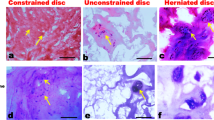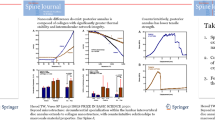Abstract
Degenerative mechanisms for the intervertebral disc are unclear, particularly those associated with cumulative trauma. This research focuses on how mechanical loading at levels below those known to cause acute trauma can lead to cellular injury. Mouse-tail discs were subjected to static bending for 1 week, then allowed to recover unloaded for 3 weeks and 3 months. Discs were analyzed using histology, in situ hybridization (collagen and aggrecan gene expression), TUNEL assay for apoptotic cell death, and biomechanics. The bent discs demonstrated loss of annular cellularity on the concave (compressed) side, while the nucleus and convex annulus appeared normal. Chondrocyte-like cells were apparent within the inner, concave annulus on the recovered discs, with evidence of proliferation at the annulus/endplate interface. However, annular architecture and biomechanical properties for the recovered discs were not different from controls, suggesting that restoration of physiologic tissue stress prevents the inner annular degradation noted in previous compression-induced degeneration models. These data demonstrate that cellular injury can be induced by transient compressive stress, and that recellularization is slow in this avascular tissue. Taken together, this suggests that cellular damage accumulation may be an important injury mechanism that is distinct from acute mechanical failure.




Similar content being viewed by others
References
Bass EC, Wistrom EV, Diederich CJ, Nau WH, Pellegrino R, Ruberti J, Lotz JC (2004) Heat-induced changes in porcine annulus fibrosus biomechanics. J Biomech 37(2):233–240
Chin JR, Lotz JC (2001) Cell death and matrix gene expression are upregulated in intervertebral discs during recovery from short durations of moderate static compression. In: Forty-seventh annual meeting of the Orthopaedic Research Society
Court C, Colliou OK, Chin JR, Liebenberg E, Bradford DS, Lotz JC (2001) The effect of static in vivo bending on the intervertebral disc. Spine J 1(4):239–245
Crean JK, Roberts S, Jaffray DC, Eisenstein SM, Duance VC (1997) Matrix metalloproteinases in the human intervertebral disc: role in disc degeneration and scoliosis. Spine 22(24):2877–2884
Giori NJ, Beaupré GS, Carter DR (1993) Cellular shape and pressure may mediate mechanical control of tissue composition in tendons. J Orthop Res 11(4):581–591
Handa T, Ishihara H, Ohshima H, Osada R, Isuji H, Obata K (1997) Effects of hydrostatic pressure on matrix synthesis and matrix metalloproteinase production in the human lumbar intervertebral disc. Spine 22(10):1085–1091
Ishihara H, McNally DS, Urban JPG, Hall AC (1996) Effects of hydrostatic pressure on matrix synthesis in different regions of the intervertebral disk. J Appl Physiol 80(3):839–846
Kim KW, Lim TH, Kim JG, Jeong ST, Masuda K, An HS (2003) The origin of chondrocytes in the nucleus pulposus and histologic findings associated with the transition of a notochordal nucleus pulposus to a fibrocartilaginous nucleus pulposus in intact rabbit intervertebral discs. Spine 28(10):982–990
Lipson SJ (1988) Metaplastic proliferative fibrocartilage as an alternative concept to herniated intervertebral disc. Spine 13(9):1055–1060
Liu GZ, Ishihara H, Osada R, Kimura T, Tsuji H (2001) Nitric oxide mediates the change of proteoglycan synthesis in the human lumbar intervertebral disc in response to hydrostatic pressure. Spine 26(2):134–141
Lotz JC, Colliou OK, Chin JR, Duncan NA, Liebenberg E (1998) Compression-induced degeneration of the intervertebral disc: an in vivo mouse model and finite-element study. Spine 23(23):2493–2506
Majno G, Joris I (1995) Apoptosis, oncosis, and necrosis. An overview of cell death. Am J Pathol 146(1):3–15
Mason RM, Palfrey AJ (1984) Intervertebral disc degeneration in adult mice with hereditary kyphoscoliosis. J Orthop Res 2(4):333–338
Miyamoto S, Yonenobu K, Ono K (1991) Experimental cervical spondylosis in the mouse. Spine 16(10 Suppl):S495–S500
Phillips FM, Reuben J, Wetzel FT (2002) Intervertebral disc degeneration adjacent to a lumbar fusion. An experimental rabbit model. J Bone Joint Surg Br 84(2):289–294
Pritzker K (1977) Aging and degeneration in the lumbar intervertebral disc. Orth Clin Nor Am 8(1):65–77
Rannou F, Lee TS, Zhou RH, Chin J, Lotz JC, Mayoux-Benhamou MA, Barbet JP, Chevrot A, Shyy JY (2004) Intervertebral disc degeneration: the role of the mitochondrial pathway in annulus fibrosus cell apoptosis induced by overload. Am J Pathol 164(3):915–924
Scapinelli R, Little K (1970) Observations on the mechanically induced differentiation of cartilage from fibrous tissue. J Pathol 101:85–91
Tiball JG, Albrecht DE (1998) Regulation of apoptosis by cellular interactions with the extracullular matrix. In: Wiley-Liss
Torgerson W, Dotter W (1976) Comparative Roentgenographic study of the asymptomatic and symptomatic lumbar spine. J Bone Joint Surg Am 58-A(6):850–853
Tornusciolo DRZ, Schmidt RE, Roth KA (1995) Simultaneous detection of TDT-mediated dUTP-biotin nick end-labeling (TUNEL)-positive cells and multiple immunohistochemical markers in single tissue sections. BioTechniques 19:800–805
Trout JJ, Buckwalter JA, Moore KC, Landas SK (1982) Ultrastructure of the human intervertebral disc. I. Changes in notochordal cells with age. Tissue Cell 14(2):359–369
Vogel KG, Koob TJ (1989) Structural specialization in tendons under compression. Int Rev Cytol 115:267–293
Wada E, Ebara S, Saito S, Ono K (1992) Experimental spondylosis in the rabbit spine. Overuse could accelerate the spondylosis. Spine 17(3 Suppl):S1–S6
White AA, Panjabi MM (1990) Clinical Biomechanics of the Spine. In: Second JB (eds) Lippincott Co., Philadelphia
Author information
Authors and Affiliations
Corresponding author
Rights and permissions
About this article
Cite this article
Court, C., Chin, J.R., Liebenberg, E. et al. Biological and mechanical consequences of transient intervertebral disc bending. Eur Spine J 16, 1899–1906 (2007). https://doi.org/10.1007/s00586-007-0476-x
Received:
Revised:
Accepted:
Published:
Issue Date:
DOI: https://doi.org/10.1007/s00586-007-0476-x




